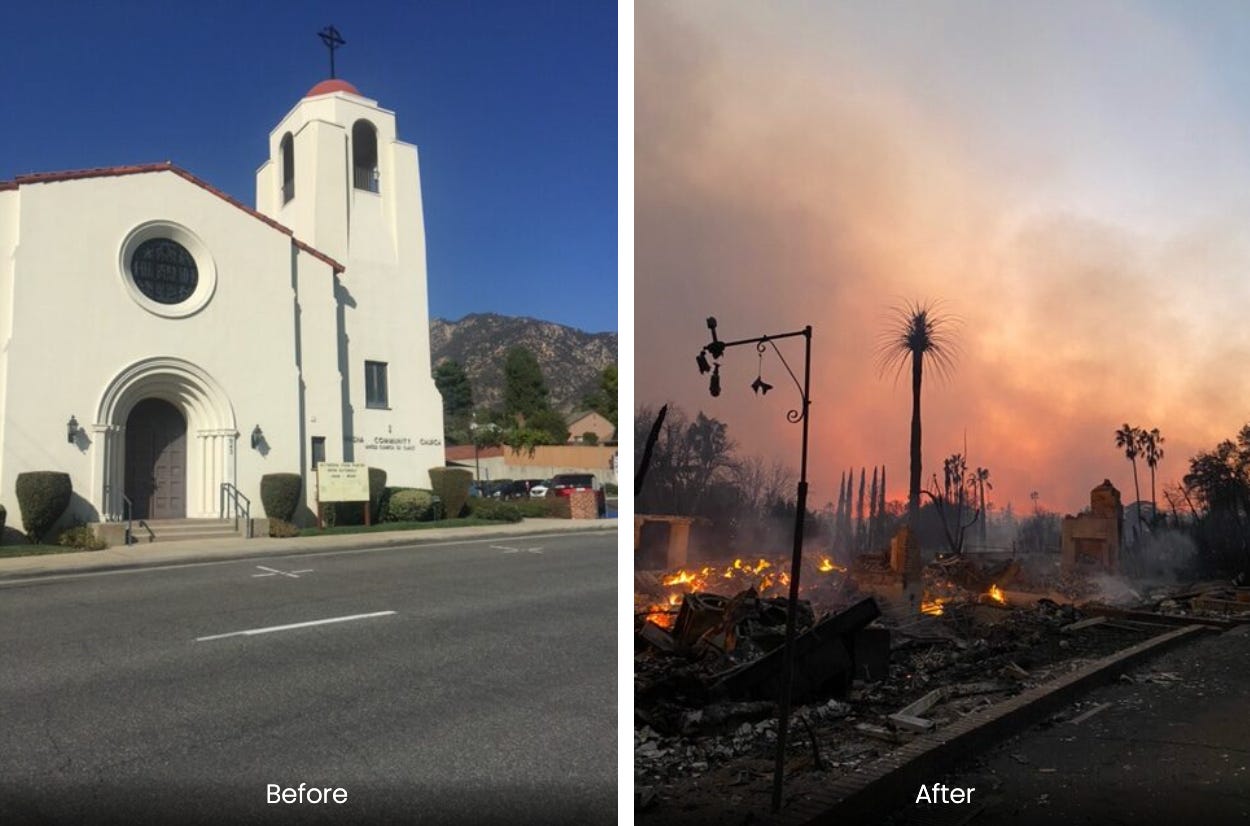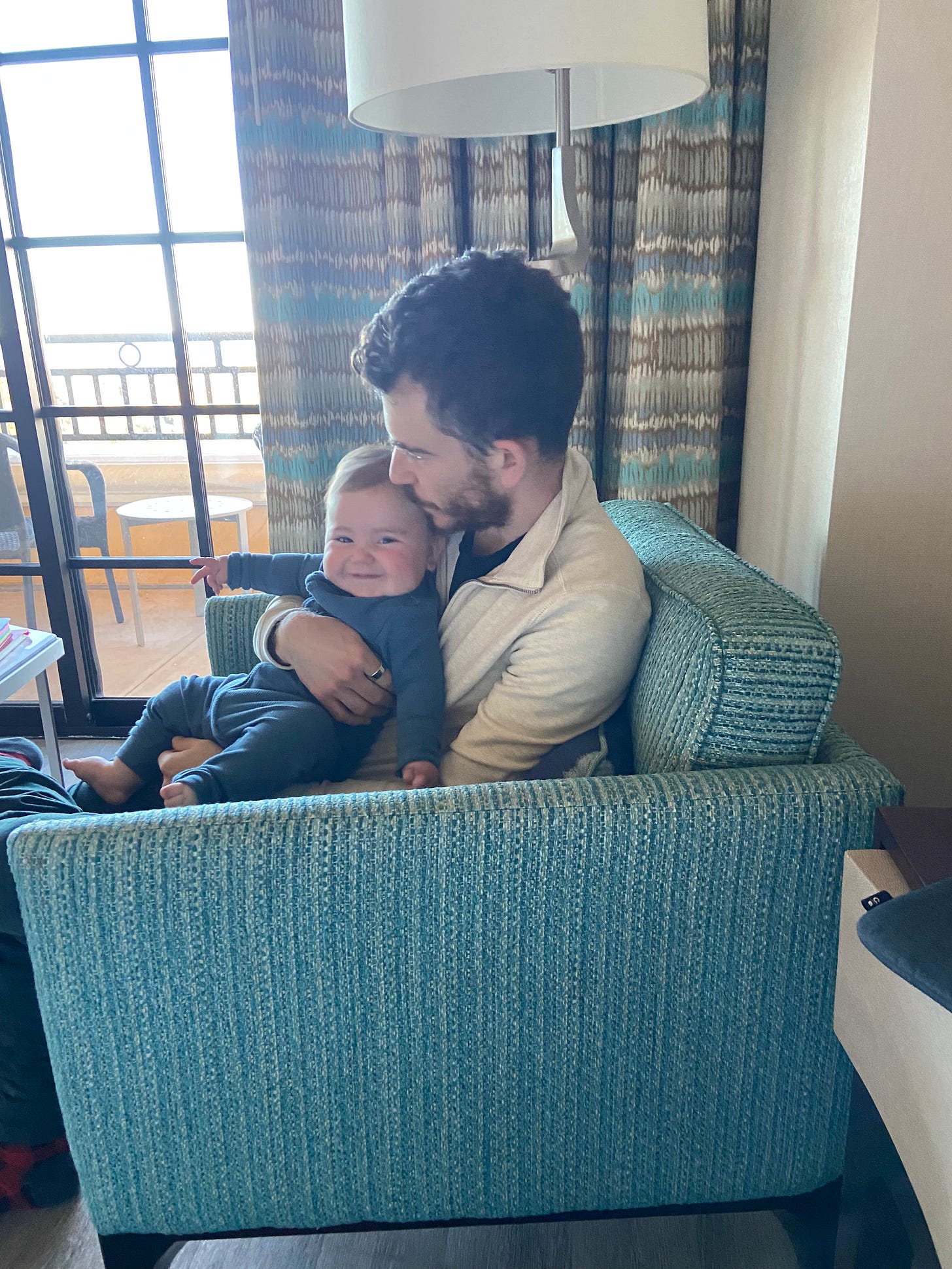On the night of Tuesday, January 7, I was supposed to play in the opening round of the San Gabriel Valley Chess Club’s New Year Swiss at the Altadena Community Church.
Less than 24 hours later, that church had burned to the ground.

I’ve lived in Los Angeles since 2013, and my heart goes out to all of the people whose lives have been turned upside-down by this cataclysm. My family and I are lucky: we had the means to leave on Wednesday morning, when the air quality became far too bad for my five-month-old son, and hop between an Airbnb and a hotel as we tried to wait it out. First we meant to stay out of town until Friday; then it became Sunday; then, yesterday, we went to a friends’ parents’ home. Our return date is TBD, but we’re safe and healthy, and it’s experiences like these that drive home just how truly that is the thing that matters.
It’s a strange situation, a milestone of sorts: my first time being displaced because of a climate-related disaster, an experience that more and more of us will have in the coming years. Of course, it doesn’t escape me that I experienced this milestone at 35, whereas my son did within the first six months of his life. Such is reality.
But reflecting on the larger issues that this event raises — climate, infrastructure, politics — is far beyond the ken of this newsletter. What falls directly within its ken — is, in fact, the physical embodiment of said ken — is the fact that the place where I play OTB burned down.
None of us ended up being there that night; the church lost power early enough that the club canceled play by 4 pm, and I’d already sent an email withdrawing because I couldn’t leave my family alone with the weather being the way it was. And I don’t think, ultimately, that the closeness to the tragedy, the what-ifs, really mean anything: there are too many people who actually lost their lives, who actually lost their homes, for me to feel all that impressed by the fact that we almost, could’ve been in the danger zone.
What I do find meaningful, though, is the disaster’s reinforcement of something I’ve increasingly noticed over the last few years: the essential quality of in-person communities.
My chess journey began before the pandemic, but, like many peoples’, it coincided with the boom that took place online after we all got shut up in our homes indefinitely. I am glad I had this resource; it’s been fun to play online. I felt genuine pride when I passed 1700 on chess.com rapid for the first time while sitting in our hotel bed in the dark Friday night as my son slept.
But at the end of the day, I still suspect that the value of online play is kind of a wash. I have a semi-compulsive relationship to it, the same kind that many people have to social media — I sometimes find myself playing when I had intended to do something else. It reminds me of how I used to feel about playing video games: it can be really fun, but often, after I stop, I wonder what the point of it all was.
Now, when I can lock in and actually take it seriously, I can filter out some of this noise: that’s partly why I favor rapid, with its 10-minute time controls that actually allow you to think, over blitz and bullet, which, at least for me, are pretty much always just mindless clicking. It’s also why I’ve gone through on-off periods of annotating my online rapid games, as Nate Solon suggests, since that forces you to derive meaning and value from what otherwise could be instantly forgotten. I would like to start doing this again!
This doesn’t help with one of the other issues, though: the culture. I had to turn off the chat function on chess.com because I got too agitated by random people I played insulting me — no matter what country a person is from, they seem to be able to talk shit in English — and I can’t tell you how many games I’ve played where my opponent, in a totally lost position, let six minutes run off the clock without making a move, just to be a dick. These aren’t enjoyable experiences.
Then there’s all of the other aspects of the Internet not unique to chess that seep their way in to it by sheer fact of being online: the misogyny, the inveterate obsession with drama, the ephemerality.
Of course, there are good spaces online as well: I’ve enjoyed being part of the ChessDojo, and I’ve just started interacting with the #chesspunks on Bluesky. But these two communities still have the quality of being online, a place where I would, at the end of the day, like to spend less time, a place that makes me feel fatigued, brittle, vulnerable, less human.
Which brings me back to the San Gabriel Valley Chess Club. I have literally no negative things to say about my time being part of a chess club. I have had only positive interactions with the people I’ve played and gotten to know through it. It’s a well-run organization, and the folks who participate in it are kind, serious about the game, and interesting human beings outside of it. At least one of them (shoutout to Christian) has been really generous with his time and attention as far as helping me with my own chess.
But even more than that, being identified with the club has had a less quantifiable and more qualitative effect on my chess. I truly believe that it has made me a chess player in a way that just screwing around online never could, no matter how high my online rating might get. Being an online chess player is kind of like being a plant in a pot: you’re alive, and you can grow, but there’s a serious limit to how big you can get and what kind of ecosystem you can belong to.
Being part of a club, on the other hand, feels like being a redwood tree. Your roots can spread out in every direction, and they can wrap themselves up with the roots of other redwoods, allowing all of the trees to grow taller in tandem. (In this metaphor, height isn’t just necessarily rating, or whatever: it’s one’s inherent health as a chess player, their passion for and relationship to the game.) Even more than that, you aren’t just a tree: you’re part of a forest. You are implicated in something bigger than yourself, and this comes with certain ineffable features of meaning and belonging that allow a pursuit to become at least partly definitional.1
Human beings are embodied creatures; we are not, or at least not yet, pure consciousness, pure information. Because of that, I believe that we require embodied experiences and frameworks in order to truly complete the connection to whatever we’re doing. There are, of course, exceptions and corollaries to this broad statement, but I think it’s a good baseline: if you want to pick up a hobby or a new plank of your identity, the best thing you can possibly do is go out and practice this thing with other people, as part of a group. In doing so, you declare yourself, even if only temporarily, as that type of person, in the eyes of your fellow humans: you put some skin in the game.2
So what does my chess club have to do with wildfires? Ultimately, nothing: chess can’t erase the suffering brought on by this disaster. But what I’ve noticed, what I think we’ve all encountered going back to 2016, is that sense of guilt that arises on social media in reaction to tragedies like this — “how can I think of or do anything else when so many people are struggling?” And maybe you shouldn’t! I’m not a philosopher.
My suggestion, however, would be that we all have to keep living, and if we’re going to do so, we should do so in community with others, doing things we find meaningful and uplifting for both ourselves and those with whom we do them. This is why I think hobbies are such a powerful and important component of civic life especially in times of disaster and bipartisanship; they allow us to define ourselves through positive endeavors undertaken in collaboration with other like-minded individuals who we never would’ve met otherwise.
The San Gabriel Valley Chess Club has provided this for me, and I’m very grateful for it. It is awful that the Altadena Community Church burned down, but not for SGVCC — it’s Altadena’s tragedy. Altadena has suffered a terrible blow. Geographic communities, neighborhoods and towns and cities, are tied to the land in addition to the people, and so they are susceptible to catastrophes like this. It’s a beautiful thing to have a relationship to place, but it can be extremely painful as well.
On the other hand, what is so lovely and enervating — and, one might argue, necessary — about organizations like a chess club, or a meditation sangha or a BJJ dojo or a writer’s group, is that they are living, breathing things: they’re organisms built out of organisms. They can exist wherever their people are, or go; they knit us together into networks of meaning and mutual identity. The club is already looking for another spot, and the intention is to host the New Year Swiss in a month or so. We’ll keep playing chess.
Anyway. If you would like to help with the fires and have the means to do so, please donate: quoting my good friend Colby Day of Hollyweird here.
For those of you not in Los Angeles, the best way you can help immediately is money. The LA Times has compiled a good list of all the different organizations you can donate to — including a link to all of the various GoFundMes that have been set up by those effected by the fires. If I were to highlight one good org I’d recommend Direct Relief, which is currently distributing masks throughout the city, and does great work for all California Wildfires.
Be safe, and do things that are meaningful to you, ideally with other people.
Now, can you abuse this? Can you go to the meditation center and sit once a month and claim you’re a spiritual person and still treat other people like shit? Can you train BJJ twice a week and say you’re an athlete and then drink yourself to sleep every night? Can you join a writer’s group and say you’re a writer and never actually share anything and just tear other peoples’ work apart? Sure! Of course! But that’s a different question altogether: that’s the question of whether you are a self-aware person or not. If you are, or, more accurately, if you are trying to be — because none of us are fully self-aware — then it is much harder to show up to these places and pretend than it is to pretend on your own, or online.





Great piece Kevin, glad to hear the chess club is picking itself up.
Kevin, could the club use any equipment donations? Please email me at chris@ia-chess.com if so.